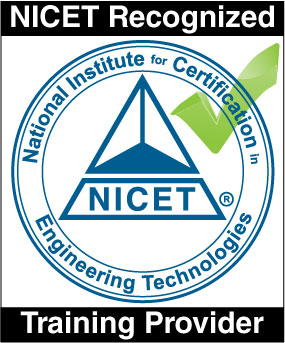
Introduction to Geographic Information Systems (GIS)

HCCC is proud to announce the Construction Management program has received an Advanced Technology Education grant award of $300,000 from the National Science Foundation (NSF).

These courses prepare students for the National Institute of Certified Engineers and Technicians (NICET) Level I, II, & III Certifications, a nationally recognized and industrywide accepted program in the field of Highway Construction Inspection. The NICET Certifications are required mainly by local and state jurisdictions, as well as by federal agencies. The National Institute of Certified Engineers and Technicians has recognized our institution as a recognized training provider for NICET Certifications.
We recognize that training comes in many forms, companies and agencies have different resources, and individuals have different learning styles. This prep program will help in measuring the competency of and layout career paths for engineering technicians and supply industries and employers with a more highly skilled workforce. The intent of this prep program is to equip students with the understanding and skills needed to achieve the NICET Certification in the field of Highway Construction.
These courses will help students in envisioning the understanding of the safety, sustainability, and environmental aspects of today’s modern construction.
The courses bridge the existing gap between theoretical knowledge and field realities. They analyze and discuss the construction industry's needs and responds to the challenges the industry faces by designing and maintaining certification programs to promote the necessary technical skills and knowledge through a fast-track schedule.
Due to continuous evolving trends in the construction industry, the market demands
high-quality skilled and knowledgeable technicians. To meet the market’s high demand,
these courses provide students an option of meeting this high market demand.
Introduction to Geographic Information Systems (GIS)
The School of Continuing Education and Workforce Development is proud to present Introduction to Geographic Information Systems course. GIS Mapping integrates specific data points into geospatial contexts, enabling organizations to analyze, interpret, and forecast information globally. It enhances understanding of spatial relationships and provides insights on issues like national security, climate change, and disaster response, depending on data quality, technology, and professional expertise.
This course offers students a thorough understanding of Geographic Information Systems (GIS), encompassing key concepts, applications, and software platforms. It delves into spatial data acquisition, management, analysis, and visualization techniques. Students will investigate diverse GIS applications across fields such as environmental management, urban planning, infrastructure analysis, human geography, and business analytics. Practical learning is reinforced through hands-on exercises and case studies to develop theoretical knowledge and real-world skills.
Upon successful completion of this course, students will be able to:
- Utilize GIS software platforms for spatial data analysis, management, and visualization. Apply spatial analysis techniques to address real-world problems in environmental management, urban planning, and infrastructure analysis.
- Demonstrate proficiency in importing, managing, and preprocessing spatial data from various sources. Conduct environmental assessments, infrastructure analysis, and demographic studies using GIS tools and techniques.
- Design and create thematic maps based on principles of cartographic design.
- Understand advanced concepts such as 3D city modeling and LIDAR data processing, and their applications in GIS.
- Communicate effectively through visual representations of spatial data and analysis results, and create story maps.
This course is ideal for:
Students: Those in environmental science, urban planning, geography, public health, or any
field where spatial data is relevant.
Professionals: Individuals seeking to enhance their data analysis, visualization, and problem-solving
skills within their respective industries.
Researchers: Anyone looking to utilize GIS for data collection, analysis, and presentation in
their research projects.
Days: Saturdays and Sundays October 25, 2025, thru November 16, 2025
Time: 9:00 am - 12:00 pm EDT
Location: Remote
Price: $350
Day 1: Orientation, course description, schedule, and student expectations.
Day 2: Spatial Data, Coordinate Systems, and Map Projections
Day 3 and 4: Spatial Data Acquisition and Management
Day 5: Spatial Analysis Fundamentals
Day 6: Human Geography and Urban Planning
Day 7: 3D City Modeling and LIDAR Data Processing
Day 8: Infrastructure Analysis & Environmental Sustainability
Technical Requirements:
Throughout the course, students will use QGIS, a free software program that provides
hands-on experience. Instructions for downloading and installing the software will
be provided at the beginning of the course.
Operating System: Windows (7/8/10/11) (Though QGIS also runs on macOS and Linux, the
class will use Windows to avoid compatibility issues).
Processor: Minimum dual-core CPU, Core i3 2.7 GHz
Memory: At least 4 GB RAM (8 GB recommended)
Storage: At least 2 GB of free disk space
Contact Information
Office of Continuing Education
161 Newkirk Street, Room E504
Jersey City, NJ 07306
(201) 360-4224
CEFREEHUDSONCOUNTYCOMMUNITYCOLLEGE